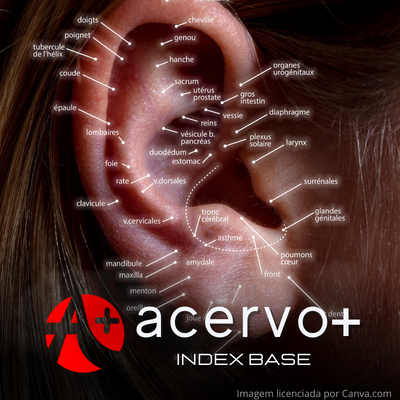Percepções de profissionais de enfermagem sobre auriculoterapia em alterações emocionais
##plugins.themes.bootstrap3.article.main##
Resumo
Objetivo: Analisar as percepções dos profissionais de enfermagem acerca da auriculoterapia enquanto terapêutica para o cuidado de alterações emocionais durante a pandemia da COVID-19 em âmbito hospitalar. Métodos: Abordagem qualitativa, com análise de 10 profissionais de enfermagem que realizaram tratamento de auriculoterapia. A coleta de dados ocorreu por meio de entrevista semiestruturada e foram analisados a partir da análise de conteúdo de Bardin. Resultados: Estabeleceram-se seis categorias: Auriculoterapia como terapêutica para redução dos sintomas de estresse, ansiedade e depressão; Auriculoterapia como terapêutica para promoção do bem estar físico e emocional; Auriculoterapia como terapêutica para promoção de relações interpessoais em profissionais de enfermagem; Auriculoterapia como terapêutica de promoção do autocuidado; Satisfação dos profissionais de enfermagem com a auriculoterapia; Percepções dos profissionais acerca da auriculoterapia realizada no local de trabalho. Conclusão: A auriculoterapia foi percebida como benéfica para melhorar as alterações emocionais dos profissionais de enfermagem durante o contexto pandêmico.
##plugins.themes.bootstrap3.article.details##
Copyright © | Todos os direitos reservados.
A revista detém os direitos autorais exclusivos de publicação deste artigo nos termos da lei 9610/98.
Reprodução parcial
É livre o uso de partes do texto, figuras e questionário do artigo, sendo obrigatória a citação dos autores e revista.
Reprodução total
É expressamente proibida, devendo ser autorizada pela revista.
Referências
2. ASSIS BB, et al. Factors associated with stress, anxiety and depression in nursing professionals in the hospital context. Rev Bras Enferm., 2022; 75(Suppl 3): e20210263.
3. BANSAL P, et al. Clinician Wellness During the COVID-19 Pandemic: Extraordinary Times and Unusual Challenges for the Allergist/Immunologist. J Allergy Clin Immunol Pract., 2020; 8(6): 1781-1790.e3.
4. BARDIN L. Análise de conteúdo. 11ª ed. Lisboa: edições 70; 2011; 280p.
5. BUCHANAN TM, et al. Reducing anxiety and improving engagement in health care providers through an auricular acupuncture intervention. Dimens Crit Care Nurs., 2018; 37(2): 87-96.
6. CORRÊA HP, et al. Effects of auriculotherapy on stress, anxiety and depression in adults and older adults: a systematic review. Rev Esc Enferm USP, 2020; 54: e03626.
7. HOU PW, et al. The History, Mechanism, and Clinical Application of Auricular Therapy in Traditional Chinese Medicine. Evid Based Complement Alternat Med., 2015; 2015: 495684.
8. JURUENA MF. Early-life stress and HPA axis trigger recurrent adulthood depression. Epilepsy Behav. 2014; 38: 148-59.
9. KUREBAYASHI LFs, da SILVA MJ. Chinese auriculotherapy to improve quality of life of nursing team. Rev Bras Enferm., 2015; 68(1) :109-15, 117-23.
10. KUREBAYASHI LFS, et al. Auriculotherapy to reduce anxiety and pain in nursing professionals: a randomized clinical trial. Rev. Latino-Am. Enfermagem, 2017; 25: e2843.
11. LANDGREN K, et al. Ear Acupuncture in Psychiatric Care From the Health Care Professionals' Perspective: A Phenomenographic Analysis. Issues Ment Health Nurs., 2019; 40(2): 166-175.
12. LIU Z, et al. Mental Health Status of Healthcare Workers in China for COVID-19 Epidemic. Ann Glob Health, 2020; 86(1): 128.
13. MELO GAA, et al. Benefits of auriculoacupuncture in nursing professionals working at COVID-19 in light of the Comfort Theory. Esc Anna Nery, 2020; 24(spe): e20200311.
14. MINAYO MSC. O desafio do conhecimento: pesquisa qualitativa em saúde. 14ª ed. São Paulo: Hucitec; 2014; 416p.
15. OLIVEIRA AMG, et al. Articulation between Integrative Practices and Health Promotion: collective actions with acupuncture in the Family Health Strategy. Rev. APS. 2022; 25(Supl 1): 8 -28.
16. OLIVEIRA CMC, et al. Auriculotherapy in nursing professionals during the coronavirus pandemic: a multiple case study. Rev. Eletr. Enferm., 2021; 23: (65678): 1-9.
17. PAPPA S, et al. Prevalence of depression, anxiety, and insomnia among healthcare workers during the COVID-19 pandemic: A systematic review and meta-analysis. Brain Behav Immun., 2020; 88: 901-7.
18. PRADO JM, et al. Experimental and placebo auriculotherapy for stressed nurses: randomized controlled trial. Rev Esc Enferm USP, 2018; 52: e03334.
19. ROMOLI M, et al. Ear acupuncture and fMRI: a pilot study for assessing the specificity of auricular points. Neurol Sci., 2014; 35 Suppl 1: 189-93.
20. RIBEIRO J, et al. Saturação da Análise na Investigação Qualitativa: Quando Parar de Recolher Dados?. Rev. Pesq. Qual., 2018; 6(10): 3-7.
21. SILVA NO, et al. Effect of Chinese auriculotherapy on the mood of health professionals: A pilot study. Rev. Enferm. UFSM, 2021; 11: 1-21.
22. TONG A, et al. Consolidated criteria for reporting qualitative research (COREQ): a 32-item checklist for interviews and focus groups. Int J Qual Health Care, 2007; 19(6): 349-57.
23. VALIANI M, et al. The effect of auriculotherapy on stress, anxiety, and depression in ms patients: a double blind randomized clinical control trial (parallel design). Acta Medica Mediterranea, 2018; 34: 561-7.
24. XIANG YT, et al. Timely mental health care for the 2019 novel coronavirus outbreak is urgently needed. Lancet Psychiatry, 2020; 7(3): 228-229.

